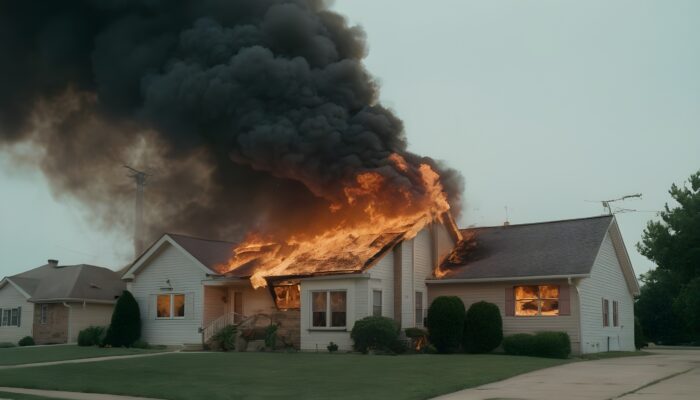Fire insurance offers protection against losses resulting from fire, lightning, and the removal of belongings threatened by fire. The policy covers replacement expenses for property damage and depreciation allowances.

Furthermore, the rates are determined by the quality of fire coverage in the residence, the form of construction, the activities applied in the building, and external losses. However, some properties, like documented records, money, and securities, are not covered by fire insurance.
Additionally, this insurance could be suspended if the risk has been enhanced by the insured or if the property has been unoccupied for a certain period. Also, either the insured or the insurer can call off the policy at any time.
Additionally, the policy might indicate that the provider should replace or rebuild damaged property rather than provide a cash settlement.
What is Fire Insurance?
Fire insurance is a form of insurance designed to safeguard properties against losses and damage caused by fire. While some policies typically include fire coverage, it is recommended to obtain additional fire coverage to cover the costs of the property insurance policy.
Typically, fire insurance plans include general exclusions such as nuclear threats, war, and associated calamities.
How Fire Insurance Works
Various homeowners insurance policies cover fire as a peril, providing protection against property damage or loss caused by a fire. Smoke is also included as a covered peril as well.
In addition, business property insurance, condo insurance, and renters insurance may also offer coverage for fire incidents. Coverage is offered by homeowners insurance for homes and any removed properties on site, including the expenses of repairs and rebuilding.
Additionally, it also provides coverage for personal belongings, and loss of coverage usage can be added as an extra cost if the home is unsuitable, such as hotel costs during repairs. Also, the coverage limit is determined either by replacement expenses or the actual cash value based on the policy selected.
Furthermore, if your cars are destroyed by fire, you can seek the comprehensive protection offered by your car insurance. After the fire incident, the claim is covered based on the damaged or lost items as directed by the insured and the insurer’s adjustment team.
This evaluation may include materials destroyed due to smoke and materials destroyed during a fire. After the full coverage of damage is decided, the policy issues a payment to the insured, including the deductible.
Examples of Fire Insurance
Some policies offer protection irrespective of the source of the fire, whether it started inside or outside the home. However, the coverage limit is based on the cause of the fire incident.
Also, damages are reimbursed to the policyholder either on a replacement-cost or actual cash value basis. In a situation where the home is said to be a complete loss, the insurer might refund the existing market value.
Furthermore, coverage offers market value compensation for lost properties, with a complete payout on the home’s overall value. For instance, if a policy covers a $450,000 house, its contents are usually covered for 60% to 80% of the policy value, which ranges from $270,000 to $360,000.
Lastly, policies usually have limits on reimbursement for luxury items like paintings, jewelry, gold, and fur coats.
Types of Fire Insurance
Entrepreneurs owning tangible assets might find fire insurance unnecessary since basic business owner’s policies usually encompass fire damage.
This coverage extends to your establishment, both attached and detached structures, office gear, and inventory. Moreover, these policies often reimburse additional operational costs if relocating your business becomes imperative.
It’s advisable to maintain an up-to-date inventory of business equipment and valuable items. Additionally, safeguard crucial documents off-site to prevent their destruction in the event of a fire.
How Much Does It Cost?
The expense of coverage against fire damage is determined by factors like coverage extent, your location, and your chosen deductible. Also, the nature of the policy (e.g., home or auto), the insurance provider, and your past claims can influence the cost.
What Does Fire Insurance Cover?
Fire insurance provides coverage for a variety of fire-related losses or damages that a policyholder may face. These include electrical fires resulting from defective wiring, gas explosions, lightning, and natural disasters.
A typical fire policy typically includes insurance protection for the following:
- Fire coverage, which is subject to the exclusions outlined in the policy.
- Lightning damage caused by lightning from any source, with or without accompanying rain, is covered.
- Explosions are limited to the area designated in the policy. For instance, explosions related to business gas usage (e.g., oxy-acetylene gas for welding) and gas works for household purposes (e.g., lighting or heating) may not be covered.
However, it’s essential to note that it also extends protection to some losses, even if a fire must be present before the coverage is applicable. This may include damage caused by water or other fire-extinguishing methods.
What Does It Not Cover?
While home insurance usually protects against fire-related losses, it commonly excludes fires arising from nuclear disasters, radiation, war, or intentional arson. For instance, if a power line hits your house and sparks a fire, there are chances it could be covered.
However, if you intentionally set your home ablaze and cause damage, the intentional incident won’t be covered. If you reside in places liable to wildfires, like California, certain insurance providers might restrict or omit this coverage from their standard policies.
Do I Need Fire Insurance?
Safeguarding your home is one of the most significant investments. Homeowner’s insurance that engages in fire protection helps to protect you from financial losses.
Additionally, the importance of fire insurance is determined by where you reside. Furthermore, places like California, which experience significant incidents of wildfires, highlight the need.
Even with a mortgage, lenders mandate homeowners’ insurance. However, it’s essential to maintain coverage even if your home is mortgage-free.
Insurance secures your finances and assets in disasters, ensuring protection even with full home equity. Homeowners insurance is indispensable unless you can independently cover rebuilding and possession replacement expenses. Confirm that your policy includes fire protection for comprehensive emergency coverage.
How to Purchase Fire Insurance
If you sense your current home or property insurance doesn’t offer the appropriate coverage for the source of fire, you can consult your insurer and request coverage limits.
The insurance company can assist you with the procedure of identifying the main items for coverage and how to evaluate their value. Furthermore, select a package that has sufficient protection to replace your property or possessions.
However, if you are concerned about fire losses to your vehicle, consult your agent to either include comprehensive coverage or verify its existing inclusion.
Conclusion
Safeguarding your home and personal belongings is a paramount investment. Shield yourself from potential financial devastation by acquiring fire insurance.


